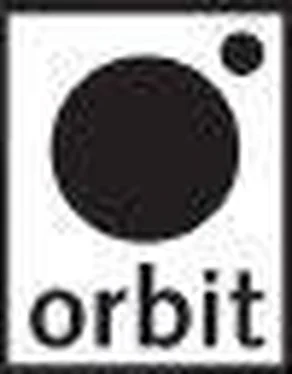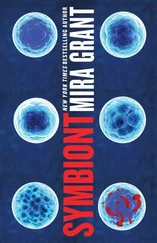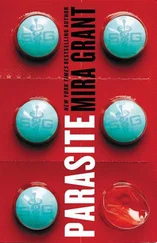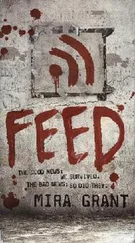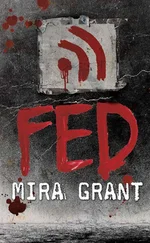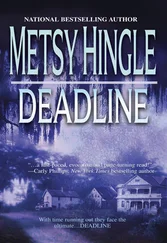“Guess it’s not that much of a legend, huh, Doc?” I glanced toward Dr. Abbey. “Is that what we’re talking about here? This remission thing?”
“The CDC is telling the truth about one thing: There’s no cure for Kellis-Amberlee, and if someone offered me one, I wouldn’t take it, for a lot of reasons. They’re also lying, because if you can live with the virus from the time you’re born, why the hell should it be able to wake up but not able to go back to sleep?” Dr. Abbey smiled encouragingly. “Isn’t story hour fun?”
“Like a heart attack,” I said.
“Two in ten thousand,” said Kelly sharply.
“What?” I asked.
“Two in ten thousand.” She stood, ignoring the gun Becks had trained on her. “That’s how many people with existing reservoir conditions are likely to recover from a live infection. Two in ten thousand. No one who didn’t have a reservoir condition has ever recovered. The rate of recovery seems to be tied to the density of the viral particles in the individual reservoir, but we don’t have any hard-and-fast proof of that. It’s not like we’ve had much opportunity for study, since you can’t exactly get volunteers for that sort of thing.”
“Not even from the prison system,” deadpanned Maggie.
Kelly winced again. I didn’t really give a fuck. If she wanted to feel guilty, she’d damn well earned her guilt. “It’s not like that,” she said.
“Bullshit,” said Dr. Abbey. “There are plenty of ways to test that sort of thing. Take Joe. I exposed him as a puppy: He got sick, he got better, he developed his first reservoir condition. I exposed him again when he hit amplification weight: He got sick, he got better, he developed his second reservoir condition. At this point, I could bathe him in the damn virus and he wouldn’t amplify. He might get a little dehydrated and have some chest pains, but they’d pass quickly. Test passed.”
“How many puppies did you start with?” countered Kelly.
Dr. Abbey looked uncomfortable for the first time. “Joe wasn’t the first subject, true. But he’s been the most successful.”
“So wait a second,” said Becks. “Are you people saying what I think you’re saying?”
“That depends. Rebecca, do you think they’re saying that a person with a pronounced enough reservoir condition can come back from zombie-dom, and that we could intentionally give babies reservoir conditios by exposing them before they’re big enough to go zombie? Because that’s what I think they’re saying. But I’m the big, dumb Irwin, remember?” I punched the window again. “George was the smart one. Too bad she’s the one who died.”
“Two in ten thousand,” repeated Kelly, like it was some sort of magic charm. “Could you have pulled the trigger if you had that figure? Could you have put the gun to her head and let her go to keep anybody else from getting hurt if you knew there was a chance—even a tiny, tiny little chance—that she’d get better?”
No, said George.
“Yes,” I said, but there was no strength behind the word. I think everyone knew that I was lying. I don’t think any of them had the right to blame me.
Kelly shook her head. “Society would collapse. Everyone would start to think they were special, they would be the ones whose mothers or fathers or children would get better. They’d start hesitating before they fired.”
“Shoot first, ask questions later,” said Becks, very quietly. “I hate to say this, Shaun, but she’s right. If people stopped shooting, it’d be a bloodbath. Nobody would be willing to risk killing somebody who might recover.”
“And while they’re sick, they’re really sick. The virus isn’t any kinder to their bodies than it would be to yours, or to mine,” said Kelly. “They can hurt people, and they can infect people, before their fevers start to go down. Can you imagine? Getting bit, and then coming out of it and learning that you’d killed and eaten your entire family? And what happens if your family isn’t actually dead, just sick? As soon as you stop registering as part of the mob, they’ll rip you apart. We won during the Rising because we learned that once someone gets bitten, you shoot. Take that away, and we’re all going to die.”
“Nice speech, but there’s something you forgot, Doc,” I said, as mildly as I could.
“What’s that?”
“She,” I hooked a thumb toward Dr. Abbey, “managed to give a dog a reservoir condition. So why the fuck aren’t we starting a program to do that for people? Why are we just sitting back and… and not trying to change things?”
“Ask her how many of the puppies didn’t have to get bitten before they amplified,” Kelly countered.
“Aw, hell,” said Alaric. “Rick’s kid.”
“What?” asked Becks.
“He had a son. He also had a wife with ovarian KA. He did a piece for the site about it, before he went off to become vice president. Their son amplified as soon as he hit the threshold weight. He was born with the live virus in his blood, and he never managed to fight it off.” Alaric looked to Kelly. “That’s what you’re talking about, right?”
“It is.” She lifted her chin a little, trying to look confident. She was only succeeding in looking scared. “We can’t start a vaccination program unless you want to start turning every baby into a little time bomb. Maybe they fight it off and just have messed-up eyesight or weird headaches. Or maybe they’ll stay sick, and then one day, they’ll turn around and try to rip your throat out. We don’t have enough control over the virus to do it. And we can’t tell people because it changes things too much.” She shot a pleading look in my direction. “Your sister was passionate about the truth, Shaun, but there are truths the world isn’t ready to hear. There are truths that are just too big.”
“Who made you the judge of that?” I asked quietly.
“Nobody.” She shook her head. “There was nobody we could ask.”
“Boo-hoo,” said Dr. Abbey. “Let me know when you people want to grow a pair and join the scientific community. We’re looking for answers. We’d love access to your lab equipment.”
“You mean join the mad scientists,” spat Kelly, guilt turning into anger in an instant.
“You say potato, I say pass the jumper cables,” said Dr. Abbey.
Alaric looked at her thoughtfully. “You said Dr. Shoji left the mainstream medical community after the cross-infection trials. What made you do it? Why aren’t you working with the CDC, trying to take them over from the inside out?”
“Simon Fraser University,” said Dr. Abbey.
Kelly stiffened before sinking back into her seat and covering her face with her hands. Alaric’s reaction was nowhere near as dramatic. His eyes widened slightly, and then he nodded, sympathetic comprehension filling his expression. “Who did you lose?”
Dr. Abbey looked down at Joe the mastiff. Maggie was stroking his ears, and he looked utterly blissful. “My husband,” she said calmly. “Joseph Abbey. He was a software engineer. I was still working for the provincial CDC back then, looking for solutions through ‘safe’ channels. I followed protocol, I maintained my lab at their professional standards, and I was stupid enough to think that meant something.”
The name of the school was familiar, but it wasn’t connecting to anything, and for once, George wasn’t helping. “Somebody fill me in,” I said.
“Joe used to give lectures to software engineering classes. They said it was good for the students to deal with someone who had ‘real-world experience.’ I always thought it was partially to remind them that there was a world off campus.” Dr. Abbey glanced my way. “Simon Fraser was a closed school. No student or faculty in and out during the semester. You came in clean, you stayed clean, you left clean. Pretty much the only risk of infection came from the outside speakers and the maintenance staff, and they were tested in every way possible. Joe used to say he couldn’t sit down for a week after he did one of his lectures.” She fell abruptly silent.
Читать дальше
